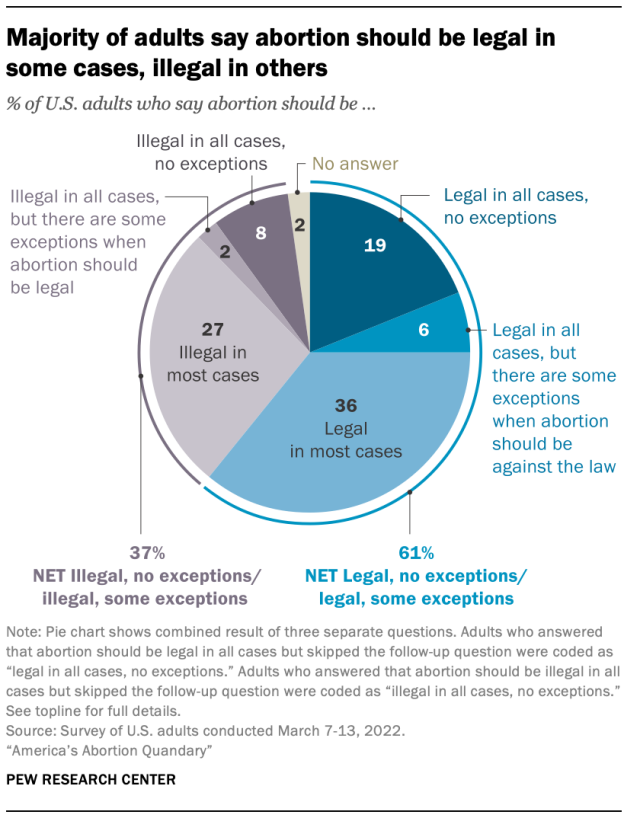I'm trying to work out how I feel about this.
Every so often, republicans in the US will accuse democrats & leftists of being "pro-abortion up to the point of birth". Sometimes they go even further and make stuff up about "post-birth abortions" (I think Trump said something about that at one point).
I always hate it when they say stuff like that because it just feels so mendacious... but honestly, I have trouble refuting it because it does seem like a fair amount of liberals & leftists are opposed to any gestational limit. (Look at the comments in this Reddit thread to get an idea of what I mean). Their reasoning seems to be that even though a qualified restriction on late-in-the-pregnancy abortions might seem like an appropriate rule to have, it's impossible to write such a law perfectly so that it would still allow abortions to be performed in every appropriate case. There would always end up being a few cases where a woman who really ought to be allowed to get an abortion would be encumbered from getting one.
I understand that argument, but... idk, I guess I just can't shake the feeling that such a law can still be implemented in a good way, and should be. The UK, the Netherlands, and Pennsylvania all have gestational limits on abortion of 24 weeks, with cases of fetal impairment, risk to the life/health of the mother, and pregnancies that resulted from r*pe excluded from the limit (as is common). I do not see the UK, the Netherlands, and Pennsylvania as particularly oppressive places for reproductive rights. As far as I know, the medical consensus is that 24 weeks is both the point when fetuses become developed enough to survive outside the womb, and also when they become developed enough to experience pain, so I do think there's some moral consideration to be given to that.
So what's the right answer here?
It's basically a moot issue; a red herring or well poisoning or whatever. 90%+ of abortions happen in the first trimester.
Women elect to abort after 7 months gestation when it is literally a case of life-or-death for the mother, or complications arise that would prevent the child from having a decent quality of life. It is less than 1%, may as well be a statistical anomaly. Nobody is fetus-maxxing and nobody is "ripping the baby out, and killing it".
Taken from the Centers for Disease Control Govt. Website
Nearly all abortions in 2021 took place early in gestation: 93.5% of abortions were performed at ≤13 weeks’ gestation; a smaller number of abortions (5.7%) were performed at 14–20 weeks’ gestation, and even fewer (0.9%) were performed at ≥21 weeks’ gestation.
I feel like people forget that doctors perform abortions. Doctors are people and have to make these sorts of ethical calls as part of their job description. I doubt you'd be able to find a doctor willing to abort a viable fetus where it is not a case of life-or-death for the mother or something else wrong with the pregnancy.
You should never bargain from a position of weakness. The Republicans want extreme gestational limits. So the democrats say "no gestational limits" because they don't want to legitimize their opponent's position.
If you walk into the room saying "just a few commonsense limits" you get bargained down to extreme limits. If you start with "no limits" then you get bargained down to "just a few common sense limits."
That’s the right call. That’s why it’s better to shift the focus away from gestational limits and towards the privacy of patients and doctors.
The doctors can set the limits with the procedures they are comfortable performing. It doesn't make any sense to make it a legal thing.
now this seems like a fun thing to bicker over. Why don't you make a post here on hexbear titled "What is the right stance to have regarding common sense gun laws?" and see what happens
I don't think anything should be labeled as common sense. The language assumes that if you agree, your opinion is the same as everyone else and must be correct. If you disagree with something labeled as common sense, you're obviously a dumb dumb and don't deserve to exist.
Well that's why the prompt is fun. It tempts fate in igniting another inglorious hexbear struggle session.
how long do you think it's ok to force a woman to continue being pregnant?
I guess my thought is that at some point they should be allowed to get an induced early birth, but not an abortion.
Maybe that’s how it is already. Or maybe I’m making a distinction without a difference. Idk, I’m willing to be corrected on this.
There's cases where in the third trimester you find out the baby isn't viable, so instead of going through the trauma of giving birth to a dead / dying baby, you could elect to get an abortion.
As for aborting a viable fetus at that point, I don't think you'll find any cases of anyone waiting that long before deciding to get an abortion.
I guess my thought is that at some point they should be allowed to get an induced early birth, but not an abortion.
a c-section is a kind of abortion.
also remember that the alternative here is risking the death or disfiguring of the parent, or infanticide. You can't stop desperation, you can only make it deadly.
Is it that hardcore of a stance to simply say that it’s the mother’s body and not allowing abortion (and especially inducing an early birth) at any point of gestation goes against giving them control of their own body?
I would have called hardcore the doggedness with which you defend a position that can vary in its extremeness. It seems to me there'd be a point at which a fetus being viable without the mother's womb makes it a dick move to abort it instead of removing it. I believe living in a society that disallowed that choice wouldn't make me feel discriminated against even if I were the one being considered while the law was being made.
removing is abortion, abortion refers to aborting the pregnancy, not the fetus
You didn't hear about the fetus blender? It's like a little immersion blender thing that fits through a tube, blends the little thing up and then slurps out the blended fetus through the tube directly into the Adrenochrome©™ lotion bottles.
If I had a nickel for every fetus in america, in the year of our lord 2021, aborted in the third trimester, I wouldn't have enough money to buy a month's worth of diapers. (Less than $30)
make stuff up about "post-birth abortions" (I think Trump said something about that at one point).>
In cases of the rich, I am 100% in favor of post-birth abortions at any age. Trump would be a good candid for it.
it's a purely theoretical issue. the number of people who remain pregnant by choice into the third trimester and then randomly change their minds for a non-medical reason are in the single digits. Quibbling over when exactly "choice" becomes "killing an unborn child" is conceding the premises of the forced-birth fandom. The correct demand is abortion on demand for free and without apology. This is the only humane position.
literally none, something can go wrong quite late & obviously anyone that went through a long ass pregnancy isn't electing to get one late on a whim. this cutting of medical options is just about killing and controlling women and establishing beachheads for full restriction
I guess I feel a lot of the commenters here are sort trying to eat their cake and have it too.
If there are no instances of healthy, low risk pregnancies being aborted after the 24 week threshold, why not ban those via a system like the UK or the Netherlands? Seems like a political freebie to dull the point on a polarizing wedge issue.
There are no instances of Loch Ness Monster attacks in North America, what is the harm in prohibiting the import of Loch Ness Monster specimans to ensure it never ever happens, just in case?
It'd be a waste of time and energy, and a needless capitulation to a fringe group of ding-a-lings.
fringe group of ding-a-lings.
I don't think that's an accurate picture of the situation.
Show
This is a pre-Dobbs poll, for one, and for two, Dobbs and its aftermath proved quite clearly that theoretical and actual political preferences can diverge rather sharply. I wouldn't assume these numbers are accurate anymore, nor that they really show who would and wouldn't support specific policies even as of the poll date (it's one thing to support a policy to a pollster and something else altogether to be ok seeing your relatives' and friends' lives threatened by that same policy).
I guess the thing Nagarjuna said about negotiating from a stronger position.
And also that even if the law were written in a considerate way, it still might encumber some abortions that it shouldn’t. It’s near-impossible to appropriately legislate every case; there’s a big range of complications that can happen at that point in pregnancy.
Let’s suppose that the standard becomes “a woman can have an abortion after 24 weeks if she’s found have a complication that has a 20% or more chance of causing death during birth”. What if a woman has a complication that might meet that standard, and one doctor says the chance is 25% but another doctor says it’s only 15%? What then? It might be better to just not intrude on the subject.
I mean it's one thing to be a savvy bargainer, but you ask about actual support. If most leftists aren't actually opposed to those limits, but are essentially being tactical, they could say that internally, but no one has done that yet.
it still might encumber some abortions that it shouldn’t
Is there evidence that the currently existing laws you refer to are doing this? I'm sure they might be encumbering abortions, but I'm not convinced the problem is totally intransigent yet.
Is there evidence that the currently existing laws you refer to are doing this?
The context under which the laws were created can change the overall effects of implementing the law, even if the exact text doesn't change. The 24-week laws were most likely created just as abortion was moving from illegal/grey-area/taboo to legal/generally accepted, so it would read more so as a law to specifically allow abortions up to 24 weeks for any reason, rather than a law which is meant to specifically restrict something. Given that it is very rare for abortions that fall under this law to actually be carried out, there hasn't be a real reason to look for it historically, so it is effectively unenforced.
However, if such a restriction was newly created, it would be moving away from a situation where abortion being legal is the status quo, so it would in effect be a law which imposes additional restrictions, rather than a law that mostly removes pre-existing restrictions. The creation of a new restriction indicates that there was no enforcement before, and thus implies that new enforcement is required. How do you create an enforcement mechanism that isn't trivially bypassed (i.e. having a given doctor just lie about the age of the fetus or level of danger towards the mother) without placing a burden on abortions that supposedly would stay legal (like some sort of verification requirement)? Especially when the religious right will try to push restrictions as far as possible? The status quo of "effectively no enforcement" (at the federal level and the state level in most blue states anyways) seems vastly preferable to the most likely results of trying to enforce anything.
Seems like a political freebie to dull the point on a polarizing wedge issue.
I don't think this is true. There is a momentum to public opinion, and adding a new restriction would push momentum in favor of the anti-abortion movement, whereas currently existing 24-week laws were created in a context where momentum was moving in favor of the pro-abortion movement. I think it's hard to deny that a newly created law is easier for right-wingers to capitalize on compared to an old law that has always been pretty much unenforced.
Even if this was passed, the right-wing media would still lie and say that millions of fully-formed babies were being killed. The only people this would convince are those who 1) would not fall for the aforementioned lie 2) consider the 24-week mark to be the most important moral distinction with respect to fetal personhood (i.e. do not believe in "life at conception" or "first heartbeat") 3) do not consider 0.05% (likely a huge overestimate) of abortions being "unjustified" to be acceptable in the name of protecting abortion rights. I don't think there are many people that fulfill all of those criteria.
Given that the benefit of such a law is pretty minimal even in the best case, raising the issue seems like a bad idea so long as the religious right still exists.












